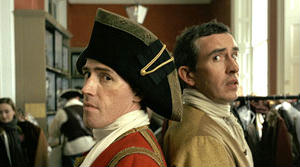
Tristram Shandy: A Cock and Bull Story (Michael Winterbottom, 2005)
I haven't read Laurence Sterne's "The Life and Opinions of Tristram Shandy," an 18th century novel from which Michael Winterbottom frames his film on. Tristram Shandy: A Cock and Bull Story can be accurately described as an adaptation of Sterne's novel the same way Spike Jonze's Adaptation (2002) is an adaptation of Susan Orlean's "The Orchid Thief." Instead of dwelling on the events that ensue in the novel, the film concentrates on the creative process, of writing ,with Adaptation, and of filmmaking, with Tristram Shandy: A Cock and Bull Story.
Tristram Shandy: A Cock and Bull Story is a film full of surprises. We are aware that the title character is an 18th century creation, yet he begins his narration with a Groucho Marx quotation. Once we get the mood of what could be a period piece, characters start destroying what was effectively woven by directly talking to the narrator. In a way, the film feels more like a "Making Of" special feature in the DVD of the more faithful adaptation of the novel with Steven Coogan as the narrator who is tasked in discussing his experiences as an actor in this supposedly important and expensive period piece. Then, one thirds of the film, the film entirely shifts focus and wades away from the novel's storyline and follows Steven Coogan in his routine as an actor, and much more surprisingly, as a new father, a boyfriend, a celebrity, and as a private individual.
The film begins with Steve Coogan (portraying himself) and Rob Brydon (also portraying himself) seated while their prosthesis and make-up are applied. They engage in mundane banter regarding the color of Brydon's teeth, and whether Brydon's role in the film (as Toby, uncle of the fictional Tristram Shandy) is a starring or a supporting role. The obvious butt of the film's larger-than-life joke is with Steve Coogan, who is one of those very good actors who haven't quite reached super star status. He can be aptly described as a B-class movie star, his most recognizable Hollywood work being Around the World in 80 Days with Jackie Chan. There's a whole lot of humor about Coogan's inadequacies and insecurities as an actor. He insists on getting higher heels for his shoes as he admits he has insecurities with his height. He gets a bizarre nightmare when his co-star Rob Brydon gets a meatier role upon his absent-minded suggestion that another novel's character be written on the screenplay to allow another star to topbill the film. For that, kudos must be given to Coogan for being so game and having what could have been uncomfortably too personal aspects of his life committed in this film, a comedy, at that.
What's more wonderful is that Coogan doesn't merely lend his personal life to the film, but also performs as himself, and as Tristram Shandy and his dad, quite well. His arguments with Brydon, his internal and external conflicts, his personal angst and professional neediness, all of these aspects burst in due fashion for our enjoyment and quiet discernment. The other characters are memorable too. Rob Brydon's presence is discomforting for Coogan, a likely competition, not only for popularity and topbilling, but also for romance and to a certain degree, machismo. Yet Brydon in the film is not a dashing fellow. He acts by the book, and in the end credits, he tells how his acting is a mixture of Al Pacino and Barbra Streisand. He's not attractive, nor is he that much taller than Coogan, yet he is a formidable competitior. Although Coogan gets the role of Tristram Shandy, Brydon's Toby has a much meatier presence, and gets a macho battle sequence, and a romantic interlude with none other than Gillian Anderson.
Michael Winterbottom's body of work notions of a recurring theme of blurring the lines of reality and fiction through cinema. In The Road to Guantanamo, he supplants a straightforward documentary about the Tipton Three with reenactments that enunciates the harsh realities sought to be hidden from the public eye. In This World tackles the concerns of refugees with Winterbottom's near-documentary cinema verite style of filmmaking. 9 Songs is both pornographic and artistic, using actual sex scenes filmed for effective titillation and as a convincing criticism of the lifelessness of romantic relationships. 24 Hour Party People is a mockumentary about rockers. Tristram Shandy: A Cock and Bull Story fits Witnerbottom's filmography like a glove as it easefully simplify the complex delineations between reality and fiction in the zany world of filmmaking.







wm.jpg)

























.jpeg)





2 comments:
Disagree that 24 Hour Party People is a mockumentary*; however, it, Cock and Bull and (to a lesser extent) 9 Songs do all share the mockumentary tendency of playing with postmodernism and the audiences expectations of what film/fiction/narrative should be. Discussion about them here.
*Or if you will...
Great blog tim, and thanks for visiting my modest blog. Of course, I'm using a much liberal interpretation of what a mockumentary is. 24 Hour Party People is definitely leaps and bounds more complex in its tackling of the that ultra-thin line between fact and fiction, as let's say, Peter Jackson's Forgotten Silver. But I do concede, I was probably too quick to label.
Post a Comment